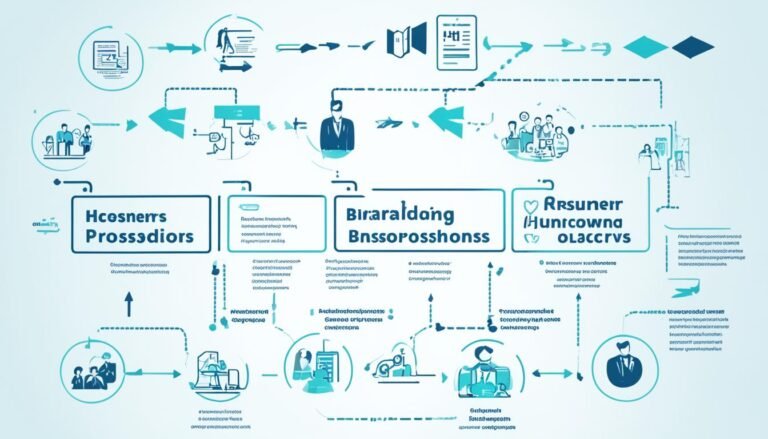A Guide to Human Resource Management Roles
Human resource management (HRM) plays a crucial role in the success of any organization. It encompasses various responsibilities, such as recruitment, employee development, performance management, and compliance. Understanding the importance and objectives of HRM is essential for fostering a thriving workplace.
Key Takeaways:
- HRM involves hiring, training, managing, and retaining employees.
- The HR department is responsible for employee management and company culture.
- HR professionals have a wide range of responsibilities, from employee relations to administrative work.
- Implementing effective HRM strategies leads to improved employee engagement and talent retention.
- The objectives of HRM include creating a positive work culture and supporting organizational goals.
What is Human Resources?
Human resources (HR) is the department or group of people within a company responsible for managing all aspects related to employees. HR departments exist to support both the company and its employees, ensuring a positive and productive work environment.
- Hiring: HR is responsible for the recruitment and selection processes. They create job descriptions, attract suitable candidates, conduct interviews, and make hiring decisions.
- Budgeting: HR plays a critical role in budgeting and allocating resources for various HR initiatives, including compensation and benefits programs.
- Recruitment: HR manages the recruitment process, from advertising job vacancies to conducting background checks and verifying references.
- Benefits Management: HR administers employee benefits programs such as health insurance, retirement plans, and vacation policies.
- Employee Satisfaction: HR is dedicated to fostering employee satisfaction by addressing concerns, providing opportunities for growth, and promoting work-life balance.
- Company Culture: HR helps shape and maintain a positive company culture by organizing team-building activities, promoting diversity and inclusion, and developing employee recognition programs.
- New Hire Training: HR facilitates the onboarding process, ensuring that new employees receive the necessary training and are integrated into the company culture.
The HR department plays a vital role in managing employee relationships, implementing policies and procedures, and fostering a productive workforce.
“The HR department is like the backbone of an organization, providing support and guidance to both employees and management. It ensures that the company’s human resources are effectively managed, enabling the organization to thrive.” – Amanda Johnson, HR Manager
HR Department Structure
| HR Roles | Responsibilities |
|---|---|
| HR Director/Manager | Oversees the entire HR department, develops HR strategies, and ensures compliance with laws and regulations. |
| Recruitment Specialist | Manages the recruitment process, screens candidates, conducts interviews, and selects suitable candidates. |
| Compensation and Benefits Specialist | Administers employee benefits, manages salary structures, and ensures fair and competitive compensation. |
| Employee Relations Specialist | Handles employee grievances, resolves conflicts, and maintains positive employee relations. |
| Training and Development Specialist | Identifies training needs, designs and implements training programs, and supports employee development. |
Human Resources Responsibilities
Human resources (HR) professionals play a crucial role in managing a variety of responsibilities that have a significant impact on the overall success of an organization. From building strong employee relations to establishing company culture, HR duties are diverse and multifaceted. Here are some of the key HR job responsibilities:
- Handling Employee Relations: HR professionals are responsible for fostering a positive work environment by establishing effective employee relations. This involves addressing employee concerns, resolving conflicts, and promoting fair and equitable treatment.
- Creating an Employment Structure: HR professionals develop and implement employment structures that define job roles, responsibilities, and reporting lines within the organization. This helps ensure clarity and efficiency in work processes.
- Managing Employee Satisfaction: HR professionals monitor and assess employee satisfaction levels and implement strategies to improve employee engagement. They may conduct surveys, analyze feedback, and develop initiatives that enhance the overall employee experience.
- Managing Employee Benefits and Compensation: HR professionals oversee employee benefits programs, such as healthcare, retirement plans, and leave policies. They also handle compensation management, ensuring that employees are fairly and competitively compensated for their work.
- Maintaining the Company’s Business Plan: HR professionals align HR initiatives and strategies with the company’s overall business plan and goals. They help translate business objectives into HR policies, procedures, and programs.
- Conducting New Hire Training: HR professionals facilitate the onboarding process for new employees, providing them with the necessary training and resources to succeed in their roles. They may conduct orientation programs, job-specific training, and compliance training.
- Screening Job Candidates: HR professionals are responsible for sourcing and screening potential job candidates. This involves reviewing resumes, conducting interviews, and assessing candidates’ qualifications and fit with the organization.
- Establishing Company Culture Standards: HR professionals play a key role in defining and maintaining the company’s culture. They create and promote values, norms, and behavior expectations that align with the organization’s mission and vision.
- Maintaining a Healthy Work Environment: HR professionals ensure a safe and healthy work environment by implementing and enforcing policies related to workplace safety, health, and employee wellness.
- Handling Necessary Administrative Work: HR professionals handle a range of administrative tasks, such as maintaining employee records, processing payroll, managing HR software systems, and ensuring compliance with employment laws and regulations.
These HR job responsibilities are essential for supporting organizational success and fostering a positive and productive work environment.
Importance of Human Resource Management
Implementing effective HR management strategies can have numerous benefits for an organization. HRM plays a crucial role in improving employee relations, raising retention rates, inspiring employee performance, and creating a positive work environment.
A well-developed HRM strategy can enhance the employee experience, increase employee engagement, and contribute to a positive brand reputation, making it easier to attract and retain top talent.
Benefits of HRM
“A strong HRM strategy can have a significant impact on employee satisfaction, productivity, and overall organizational success.” – Mark Johnson, HR Director at ABC Corporation
Let’s explore the key benefits of implementing effective human resource management practices:
- Improved employee relations: HRM focuses on fostering positive relationships between employees, management, and stakeholders, creating a harmonious work environment.
- Increased talent retention: By prioritizing employee satisfaction and providing opportunities for growth and development, HRM helps retain valuable talent within the organization.
- Inspired employee performance: Effective HRM strategies, such as performance management and recognition programs, motivate employees to perform at their best and contribute to the company’s success.
- Enhanced employee engagement: HRM practices, such as employee feedback systems and team-building activities, boost employee engagement, leading to higher productivity and job satisfaction.
- Positive work environment: HRM ensures a fair and inclusive workplace culture, promoting diversity, equality, and respect among employees, which contributes to a positive work environment.
- Greater brand reputation: A well-managed HR department and positive employee experiences foster a strong brand reputation, making the organization an attractive choice for both customers and potential employees.
By recognizing the importance of human resource management, organizations can invest in developing effective HRM strategies that prioritize employee engagement, talent retention, and overall organizational success.
| Benefits of HRM | Description |
|---|---|
| Improved employee relations | Focuses on fostering positive relationships between employees, management, and stakeholders, creating a harmonious work environment. |
| Increased talent retention | Prioritizes employee satisfaction and provides opportunities for growth and development, resulting in higher employee retention rates. |
| Inspired employee performance | Motivates employees through performance management and recognition programs, leading to increased productivity and success. |
| Enhanced employee engagement | Boosts employee engagement through feedback systems and team-building activities, resulting in higher job satisfaction and commitment. |
| Positive work environment | Ensures a fair and inclusive workplace culture that promotes diversity, equality, and respect among employees. |
| Greater brand reputation | Well-managed HR departments and positive employee experiences contribute to a strong brand reputation, attracting customers and top talent. |
Objectives of Human Resource Management
The main objective of Human Resource Management (HRM) is to fulfill staffing needs while creating and maintaining a positive work environment. HRM is essential for organizations in achieving their organizational goals and optimizing organizational behavior. By implementing effective HRM strategies, businesses can create a positive work culture, improve employee engagement, and support the overall success of the organization.
Optimizing Organizational Behavior
One of the key objectives of HRM is to optimize organizational behavior. HR professionals strive to create an environment where employees feel motivated, satisfied, and dedicated to their work. This involves developing and implementing policies and practices that encourage positive employee behavior, productivity, and collaboration.
Achieving Organizational Goals
HRM plays a vital role in helping organizations achieve their goals. By effectively managing and aligning the skills, knowledge, and abilities of employees with the objectives of the organization, HR professionals contribute to the overall success of the business. This includes strategic workforce planning, talent management, and performance management.
Creating a Positive Work Culture
Another important objective of HRM is to create a positive work culture. This involves developing and promoting values, beliefs, and behaviors that foster a supportive and inclusive working environment. By ensuring fairness, diversity, and respect, HR professionals contribute to employee satisfaction, engagement, and retention.
Implementing Training and Development Programs
HRM aims to enhance the knowledge, skills, and abilities of employees through training and development programs. By providing opportunities for growth and learning, HR professionals help employees reach their full potential while also meeting the organization’s changing needs.
Supporting Employee Empowerment
HRM objectives also include supporting employee empowerment. This involves creating a work environment where employees are encouraged to take ownership of their work, make decisions, and contribute to the success of the organization. HR professionals play a crucial role in facilitating employee involvement, participation, and engagement.
Improving Retention Rates
Retention of talented employees is a key objective of HRM. By implementing strategies that promote employee satisfaction, work-life balance, and professional growth, HR professionals aim to reduce turnover rates and retain valuable talent within the organization.
Ensuring Compliance with Employment Laws and Regulations
HR professionals are responsible for ensuring that the organization complies with relevant employment laws and regulations. This includes staying updated on labor laws, managing employee benefits and compensation in accordance with legal requirements, and implementing fair and ethical practices in all HR processes.
Overall, the objectives of HRM are multifaceted, focusing on staffing, organizational behavior, culture, training, retention, and compliance. By effectively fulfilling these objectives, HRM contributes to the success and sustainability of the organization, creating a dynamic and thriving work environment.
HRM Career Opportunities and Requirements
Human Resource Management (HRM) offers a wide range of career opportunities for individuals with exceptional organizational and problem-solving skills. Whether you are starting your journey in HR or aiming for leadership roles, there are various paths you can pursue.
Entry-level HR positions typically require a bachelor’s degree in HR or a related field. This educational foundation equips professionals with a solid understanding of HR principles, practices, and legal regulations. Gaining experience in entry-level roles allows individuals to develop essential skills and knowledge in areas such as recruitment, employee relations, and HR administration.
An HR degree builds competencies in strategic decision-making, conflict resolution, and performance management, preparing professionals for advanced roles in the HR field.
For those aiming for HR management or leadership positions, pursuing advanced education can be beneficial. Pursuing a Master of Business Administration (MBA) or a master’s degree in HRM can deepen your understanding of strategic HR practices, organizational behavior, and leadership. These advanced degrees can position you for high-level HR roles or opportunities in consultancy.
In addition to formal education, HR professionals can bolster their qualifications by obtaining certifications from reputable organizations such as the Society for Human Resource Management (SHRM) or the Human Resource Certification Institute (HRCI). These certifications validate your expertise and demonstrate your commitment to professional development.
Effective HR professionals should possess a strong understanding of HR systems and technologies. Familiarity with HR information systems (HRIS) and other HR software can streamline processes and enhance data analysis capabilities. Furthermore, a comprehensive understanding of labor laws and regulations is crucial to ensuring compliance and mitigating legal risks.
Excellent communication and interpersonal skills are vital for HR professionals as they often interact with employees, management, and external stakeholders. Building relationships, effectively communicating policies and procedures, and mediating conflicts are essential components of HR responsibilities.
With the increasing emphasis on data-driven decision-making, HR professionals who possess analytical skills and the ability to derive insights from HR metrics are highly sought after. These skills enable HR professionals to identify trends, make informed recommendations, and contribute to strategic decision-making within the organization.
Take a look at the table below for a comprehensive overview of the qualifications and skills required for different levels of HR positions:
| Position | Education | Certifications | Skills |
|---|---|---|---|
| HR Assistant | Bachelor’s degree in HR or related field | N/A | Basic knowledge of HR principles and practices, interpersonal skills, attention to detail |
| HR Coordinator | Bachelor’s degree in HR or related field | N/A | HR systems knowledge, communication skills, organizational skills, ability to handle multiple tasks |
| HR Specialist | Bachelor’s degree in HR or related field | Optional: SHRM-CP, HRCI aPHR, or other HR certifications | Employee relations, recruitment and selection, knowledge of labor laws, analytical skills |
| HR Manager | Bachelor’s degree in HR or related field (Master’s degree preferred) | Recommended: SHRM-SCP, HRCI PHR/SPHR, or other HR certifications | Leadership skills, strategic thinking, knowledge of HR systems and metrics, change management |
| HR Director | Bachelor’s degree (Master’s degree preferred) | Recommended: SHRM-SCP, HRCI SPHR/GPHR, or other HR certifications | Strategic HR management, business acumen, strong leadership and communication skills |
A career in HRM offers immense potential for professional growth and the opportunity to make a positive impact on an organization’s success. By continuously developing your skills, staying updated with industry trends and regulations, and leveraging educational opportunities, you can position yourself for a rewarding and fulfilling career in HR management.
Difference between HR and HRM
Understanding the distinction between Human Resources (HR) and Human Resource Management (HRM) is crucial for organizations as they navigate employee management and organizational optimization. While HR refers to the department that handles tasks related to hiring, compensation, and employee administration, HRM encompasses a broader set of responsibilities.
HR focuses on specific tasks and resources associated with employee management within the company. This includes tasks such as:
- Recruitment and selection
- Employee benefits administration
- Compensation management
- Employee relations
- Performance management
- Training and development
HRM, on the other hand, takes a more strategic approach to effectively organizing and optimizing employees within the organization. The responsibilities of HRM include:
- Strategic planning
- Decision-making
- Personnel management
- Employee development and career planning
- Workforce analytics and forecasting
- Succession planning
By encompassing strategic planning and long-term personnel management, HRM plays a critical role in aligning human resources with organizational goals and objectives. It goes beyond the day-to-day tasks of HR and focuses on creating a positive work environment, fostering employee growth, and driving organizational success.
HRM is a holistic approach that considers the bigger picture of the organization’s workforce and its alignment with the overall business strategy. It involves decision-making that complements the organization’s long-term vision and goals.
While HR and HRM are distinct, they are interconnected and collaboratively contribute to the effective management and optimization of an organization’s human resources.
| Human Resources (HR) | Human Resource Management (HRM) |
|---|---|
| Handles day-to-day tasks and resources related to employee management | Takes a strategic approach to organize and optimize human resources within an organization |
| Focuses on hiring, compensation, benefits, and employee administration | Emphasizes strategic planning, decision-making, and personnel management |
| Manages employee relations and performance | Oversees employee development, career planning, and work environment |
| Ensures compliance with labor laws and regulations | Contributes to long-term organizational success and alignment |
Skills and Responsibilities of an HR Manager
An HR manager plays a critical role in the organization by overseeing various aspects of employee management and ensuring a positive work environment. To excel in this position, an HR manager should possess a range of skills and qualifications that contribute to their effectiveness and success.
Skills Required for an HR Manager
- Degree in HR or Related Fields: An HR manager should have a solid educational foundation in human resources, business administration, or related fields to understand the core principles and concepts of HR management.
- Experience in HR Management: Previous experience in HR management roles is valuable, as it provides practical knowledge and insights into handling employee-related challenges, strategic decision-making, and organizational dynamics.
- Knowledge of HR Systems and Labor Laws: An HR manager needs to have a thorough understanding of HR systems and technology, including HRIS (Human Resource Information Systems), and stay updated with labor laws and regulations to ensure compliance with employment practices.
- Attention to Detail: Attention to detail is essential for an HR manager to handle administrative tasks, maintain accurate employee records, and manage compensation, benefits, and payroll systems accurately.
- Excellent Communication and Interpersonal Skills: Effective communication and interpersonal skills are vital for an HR manager to interact with employees, resolve conflicts, provide guidance, and establish positive working relationships throughout the organization.
Responsibilities of an HR Manager
An HR manager has diverse responsibilities that contribute to the overall success of the HR function and organizational goals. Some key responsibilities include:
- Talent Acquisition: Overseeing the recruitment and selection process to attract qualified candidates and build a talented workforce.
- Talent Management Alignment: Aligning HR strategies and practices with the organization’s talent management goals to promote employee development and retention.
- HR Department Workflow: Managing the day-to-day operations of the HR department, ensuring efficient workflow, and optimizing HR processes.
- Analyzing Compensation Trends: Monitoring and evaluating compensation trends to ensure the organization remains competitive in attracting and retaining top talent.
- Handling Performance Reviews: Implementing performance management systems and conducting performance reviews to promote employee growth and organizational effectiveness.
- Ensuring Legal Compliance: Staying up-to-date with employment laws and regulations and ensuring the organization adheres to legal requirements in all HR-related matters.
Combining these skills with the responsibilities of an HR manager ensures effective workforce management and contributes to a positive work environment.
How to Become a Human Resources Manager
Becoming an HR manager is an attainable goal for individuals with a passion for people management and a strong understanding of organizational dynamics. Here are the essential steps to kickstart your career in HR management:
Educational Requirements
To pursue a career as an HR manager, a bachelor’s degree in HR, business administration, or a related field is usually required. This education equips you with fundamental knowledge of HR principles, practices, and strategies. Higher-level positions may benefit from a master’s degree, such as an MBA, which provides a deeper understanding of business management and leadership.
Experience in HR Management
Prior experience in HR management positions is crucial to advance to an HR manager role. It allows you to develop a comprehensive understanding of HR processes, policies, and challenges. Early in your career, gaining experience in various HR functions, such as recruitment, employee relations, and performance management, can lay a strong foundation for future success.
Continuous Learning and Development
The field of HR management is constantly evolving, with new trends, technologies, and best practices emerging regularly. Staying updated with the latest labor laws, HR systems, and metrics is essential for an HR manager’s success. Taking part in professional development programs, attending workshops and conferences, and obtaining certifications from reputable HR organizations demonstrates your commitment to continuous learning and development.
Building a Professional Network
Networking is key to career growth in any field, and HR management is no exception. Engaging with professionals in the HR industry, joining HR associations, and participating in HR-related events can open doors to new opportunities. Building a strong professional network allows you to stay connected, share knowledge and experiences, and learn from industry experts.
Showcasing Key Skills
HR managers need a diverse set of skills to excel in their roles. Communicating effectively, both verbally and in writing, is crucial for interacting with employees, negotiating contracts, and addressing conflicts. Strong interpersonal skills enable HR managers to build relationships, resolve issues, and motivate teams. Attention to detail, critical thinking, and problem-solving abilities are also important in handling complex HR challenges.
Embracing HR Manager Responsibilities
As an HR manager, you will be responsible for overseeing all HR functions within an organization, including talent acquisition, employee development, compensation and benefits, employee relations, and compliance with labor laws. It is essential to familiarize yourself with these responsibilities and develop strategies to effectively carry them out.
Remember, becoming an HR manager is a journey that requires dedication, continuous learning, and practical experience. With the right qualifications, skills, and mindset, you can forge a successful career in the dynamic field of HR management.
Now, let’s take a look at a comprehensive table summarizing the key steps to becoming an HR manager:
| Steps to Become an HR Manager |
|---|
| Earn a bachelor’s degree in HR, business administration, or a related field |
| Gain experience in HR management positions |
| Consider pursuing a master’s degree or certifications |
| Stay updated with labor laws and HR best practices |
| Engage in professional development and networking opportunities |
| Develop strong communication, interpersonal, and problem-solving skills |
| Familiarize yourself with HR manager responsibilities |
By following these steps and taking advantage of opportunities to grow and learn, you can pave the way for a rewarding career as an HR manager.
HRM Tools & Software
Human Resource Management (HRM) encompasses a wide range of positions and objectives aimed at effectively managing and optimizing the workforce. To streamline HR processes and enhance efficiency, various tools and software solutions are available in the market.
One of the popular HRM tools is the Human Resource Information System (HRIS), which helps organizations manage critical HR data and processes. HRIS enables efficient applicant tracking, onboarding, and employee data management. It also facilitates payroll management, making it easier to calculate compensation and maintain accurate records.
Another essential tool in HRM is the Human Management Resource System (HMRS), which provides comprehensive functionalities to support employee performance management. It allows companies to set performance goals, track progress, conduct performance reviews, and provide constructive feedback. HR professionals can analyze performance data to identify skills gaps and implement targeted training programs.
These HRM tools simplify administrative tasks, reducing manual effort and saving time. They also enable better analysis of HR-related data, providing valuable insights for strategic decision-making. By leveraging HRIS and HMRS, organizations can enhance their HR operations, focus on employee development, and foster a positive work environment.
Investing in advanced HR software solutions is crucial for businesses striving to improve overall HR management and drive productivity. These tools ensure compliance with employment laws, promote employee engagement, and enhance the effectiveness of HR departments in achieving organizational goals.
Benefits of HRM Tools & Software:
- Automation of repetitive administrative tasks
- Streamlined applicant tracking and onboarding processes
- Efficient payroll management and accurate compensation calculations
- Enhanced performance management and goal tracking
- Access to real-time HR data for strategic decision-making
- Improved compliance with employment laws and regulations
- Increased employee engagement and satisfaction
HRM Trends
As human resource management (HRM) continues to evolve, incorporating the latest trends is crucial for organizations to stay competitive in attracting and retaining top talent. Contemporary HRM practices focus on enhancing the employee experience, promoting work-life balance, and fostering a positive work culture. Here are some of the key trends shaping HRM today:
Emphasis on Employee Experience
Employee experience has become a central theme in HRM. Companies are focusing on creating a positive work environment, offering opportunities for growth and development, and ensuring employee satisfaction. By prioritizing the employee experience, organizations can boost engagement, productivity, and retention rates.
Promoting Work-Life Balance
In recognition of the importance of work-life balance, HRM practices now emphasize flexible work arrangements, including remote work options and flexible schedules. This allows employees to achieve a better balance between their personal and professional lives, leading to higher job satisfaction and overall well-being.
Providing Employee Perks
To attract and retain top talent, companies are offering a wide range of employee perks and benefits. These perks may include generous paid time off, comprehensive health and wellness programs, flexible compensation packages, and opportunities for skill development. Employee perks not only enhance job satisfaction but also contribute to a positive organizational culture.
“Investing in employee experience and work-life balance is no longer just a perk; it’s a strategic imperative in today’s competitive job market.” – Jane Foster, HR Manager
By implementing these trends, organizations can create a work environment that prioritizes employee well-being, fosters engagement, and attracts and retains talented individuals. Taking steps to enhance the employee experience, promoting work-life balance, and offering enticing employee perks can position companies as employers of choice in today’s dynamic labor market.
Data on the Impact of HRM Trends
Being able to showcase the impact of HRM trends is crucial for organizations seeking to optimize their human resources. The table below highlights the positive outcomes that can be achieved by implementing these trends:
| Trend | Benefits |
|---|---|
| Emphasis on Employee Experience |
|
| Promoting Work-Life Balance |
|
| Providing Employee Perks |
|
Implementing these HRM trends can bring about tangible benefits for organizations, improving employee satisfaction, productivity, and organizational success.
For small to medium-sized businesses that may not have the internal resources to manage these tasks effectively, outsourcing hr can be a valuable alternative. By partnering with experienced HR consultants, businesses can access the expertise and support needed to manage their workforce efficiently without the overhead of a full-time HR team. If you are located in the UK and are looking for a company who will handle your outsourced hr Manchester have a wide variety of reliable and quality companies.
Conclusion
In conclusion, human resource management (HRM) is a critical function within organizations that encompasses various responsibilities such as recruitment, employee development, performance management, and compliance. By understanding the importance and objectives of HRM, businesses can create a positive work environment, optimize their human resources, and achieve organizational goals.
Implementing effective HRM strategies and utilizing HRM tools are key in improving employee engagement and retention, as well as overall organizational success. HR managers play a crucial role in overseeing staffing, making strategic decisions, and ensuring positive employee experiences.
With the ever-evolving trends in HRM, it is increasingly important for organizations to focus on enhancing the employee experience, promoting work-life balance, and creating a positive work culture. By doing so, businesses can attract and retain top talent, which ultimately contributes to the growth and success of the organization.







